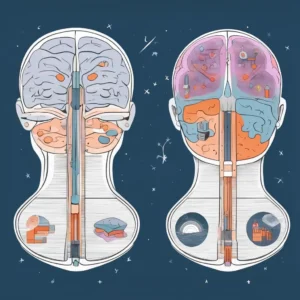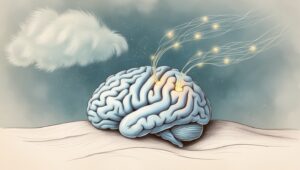
We all know that sleep is important, but have you ever wondered why? It’s not just about feeling rested; sleep is crucial to our overall health and well-being. Understanding the science behind sleep can help you improve your daily routine, boost your productivity, and even enhance your mood. Let’s explore why sleep is essential and how it impacts your body, mind, and life.
The Science of Sleep: What Happens When You Sleep?
Sleep isn’t just a passive activity; it’s a complex process that your body and brain go through. During sleep, your body performs several critical functions that help maintain both physical and mental health. These processes are divided into two main stages: REM (Rapid Eye Movement) sleep and non-REM sleep.

-
Non-REM Sleep: Restoring the Body
During non-REM sleep, which makes up about 75% of your sleep cycle, your body goes through deep restorative processes. This includes muscle repair, tissue growth, and the strengthening of your immune system. Here’s what happens during non-REM sleep:
- Muscle Repair: This is when your muscles heal and regenerate, ensuring that you wake up feeling refreshed.
- Cell Growth: Your body releases growth hormones, which help in the repair and development of cells and tissues.
- Memory Consolidation: Your brain processes the day’s events and stores them in long-term memory, making it easier for you to recall them later.
-
REM Sleep: Revitalizing the Mind
REM sleep is essential for brain function. This stage is associated with vivid dreams and plays a key role in memory, learning, and emotional regulation. Here’s what happens during REM sleep:
- Memory Processing: Your brain sorts and stores memories, helping you retain information you’ve learned during the day.
- Emotional Regulation: REM sleep helps process emotions, which is why you often wake up feeling emotionally balanced.
- Brain Health: During REM, your brain gets rid of waste products, keeping your cognitive functions sharp.
Why Sleep is Essential for Your Health
Sleep isn’t just for recovery—it’s necessary for maintaining your physical and mental health. Here are some of the most significant ways sleep affects your well-being:
-
Boosts Immune Function
Did you know that sleep helps strengthen your immune system? While you sleep, your body produces cytokines, a protein that helps fight infections, inflammation, and stress. When you don’t get enough sleep, your immune system weakens, making you more susceptible to illnesses.
-
Enhances Cognitive Function
Getting quality sleep improves your focus, problem-solving abilities, and creativity. During the night, your brain processes and organizes information, helping you think more clearly during the day. Lack of sleep can impair memory, and decision-making, and even slow down reaction time.
-
Regulates Mood and Emotions
Have you ever noticed how a bad night’s sleep can make you feel irritable or anxious the next day? Sleep plays a major role in regulating your mood. When you sleep well, you wake up feeling more positive and ready to take on the day. In contrast, sleep deprivation can lead to mood swings, anxiety, and even depression.
-
Affects Weight and Metabolism
Did you know that sleep can affect your weight? Studies have shown that poor sleep can disrupt the hormones that control hunger, making you feel hungrier and more likely to crave unhealthy foods. Over time, sleep deprivation can lead to weight gain and metabolic issues.
-
Supports Physical Health
Sleep is also essential for your physical health. Lack of sleep has been linked to various health issues, including:
- Heart Disease: Sleep helps lower blood pressure and reduce the risk of cardiovascular problems.
- Diabetes: Poor sleep can affect insulin sensitivity, increasing the risk of type 2 diabetes.
- Obesity: As mentioned earlier, sleep regulates hormones that control appetite and metabolism.

The Impact of Sleep on Performance and Productivity
You’ve probably noticed that you perform better when you’re well-rested, but the science behind it is fascinating. Sleep improves concentration, cognitive performance, and creativity, all of which are crucial for daily tasks, work, and learning. Here’s how:
- Improved Focus: Sleep helps sharpen your focus, making it easier to complete tasks efficiently.
- Better Memory: As sleep consolidates memories, you can retain and recall information better.
- Increased Creativity: Quality sleep promotes problem-solving abilities and creative thinking.
How Much Sleep Do You Need?
The ideal amount of sleep varies from person to person. However, here’s a general guideline based on age:
- Newborns (0-3 months): 14-17 hours
- Infants (4-11 months): 12-15 hours
- Toddlers (1-2 years): 11-14 hours
- Preschoolers (3-5 years): 10-13 hours
- School-age children (6-13 years): 9-11 hours
- Teens (14-17 years): 8-10 hours
- Adults (18-64 years): 7-9 hours
- Older Adults (65+ years): 7-8 hours
Tips for Better Sleep: How to Improve Your Sleep Hygiene
Improving your sleep quality doesn’t have to be complicated. Here are some simple tips to help you sleep better:
- Create a Relaxing Bedtime Routine: Wind down with calming activities like reading or taking a warm bath.
- Maintain a Consistent Sleep Schedule: Go to bed and wake up at the same time every day, even on weekends.
- Limit Screen Time: Avoid phones, computers, and TVs at least an hour before bed to prevent blue light from disrupting your sleep cycle.
- Keep Your Bedroom Cool and Dark: A cooler, darker environment promotes better sleep.
Conclusion: Prioritize Sleep for Better Health and Well-being
Sleep is not just a luxury; it’s essential for maintaining both physical and mental health. By understanding the science behind it, you can make better choices to prioritize rest and improve your overall quality of life. Sleep isn’t something to be taken for granted—it’s a vital process that rejuvenates your body, sharpens your mind, and ensures long-term health. So, make sleep a priority, and reap the benefits of better health, improved productivity, and enhanced well-being.
Call to Action:
Are you ready to improve your sleep? Start implementing some of the tips above and see the difference it makes in your life. Share this article with your friends and family to help them understand why sleep is so essential, and let’s all commit to a better night’s rest!
